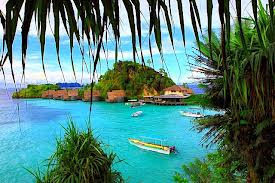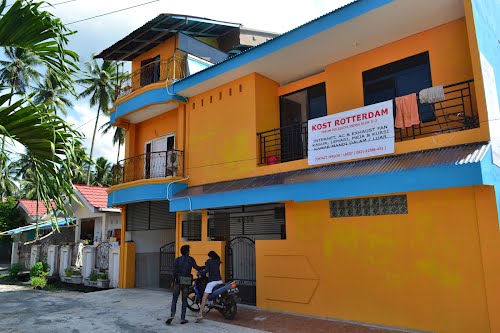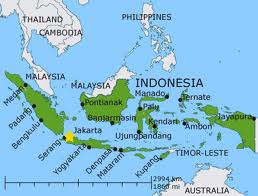Indonesia is a Refuge from Toxic Western Culture
May 1, 2016
 Indonesia is the world's fourth most populous country
Indonesia is the world's fourth most populous country with 240 million people on 17,000 islands. But according to
Bernard Grover, a Texan who has lived there for almost six years,
there is plenty of room for enterprising Westerners escaping
the toxic political and cultural environment at home.
"Interestingly, Westerners are treated with great respect, deserving or not. Indonesian women are highly attracted to white, and especially older, males. The immigration laws are extremely protectionist, but when a nation has 250 million people to keep employed or face a revolution, the choice is to encourage economic activity. There's also the matter of having been colonized by brutal Western powers for centuries and it's understandable why they would want to keep a tight rein on Westerners here. However, the past does not affect the Indonesian's genuine warmth and acceptance, and the almost annoying curiosity. The only way to blow it here is to be surly and superior. In a nutshell, you get what you give."
I asked Bernard to give me the lowdown on entry requirements, making a living, cost of living and other need-to-knows.

(from July 17, 2013)
By Bernard Grover (left with wife & orang outang)
(henrymakow.com)
Jakarta - Living away from the US feels very liberating. I notice the difference every time I catch some US TV. The soft, weak men. The
wise-cracking Jews who are the only ones allowed to speak their minds.
The hard, demanding, high maintenance women, and the smart-aleck,
disrespectful children. When I watch the programs, all I hear are women
belittling men for not being emotional basket-cases or good enough in
bed, unless the man is gay and then he's instantly OK no matter what his
character. Honestly, I can't think of any part of modern American
culture that I miss.
Here, no one defines himself by who they sleep with. There is a constant focus on religion (which can be annoying.) Children are respectful. Women are demur. Men
are strong and confident. Diversity means being diverse and not
marching in ideological lock-step. People speak their minds.
Homosexuals are around, but if they even thought of demanding special
rights and sensitivity training in schools, they would quickly find
insurmountable barriers.
And when it comes to police state, the
metal detectors aren't plugged in and most of the show is a put-on just
to make Westerns feel secure. Beat police are not armed and most people
take care of their own, avoiding contact with government agents of any
kind for any reason. Everyone knows the agents are crooked and treat
them accordingly.
ENTRY REQUIREMENTS
You can get a visa on arrival ($25) for 30 days and renewable once before having to exit. A social visa ($45) with a sponsor is obtained at a consulate outside the country and lasts 45 days, renewable four times before exiting. After age 55, you can get an annual retirement visa ($800) with a sponsor and renewable up to four times before exit. If you are married to an Indo citizen, you can get the new 10-year permanent resident visa, but there have been some horror stories because the supporting regulations are not yet settled. It costs $5,000. There is a gray area that allows you to look for work on a tourist visa as long as you are not receiving income locally.
In the
past couple of years, the barriers to entry have been going up all
across Asia. In Indonesia, it used to be enough to
be a native speaker of English to get a teaching job. At the moment,
you need a BA in English, at minimum.
 The average English teacher makes less
than $2,000/month, and the contract usually includes your visa and
work permit for one year, a housing allowance, airfare to and from
the US, and transportation by taxi to and from work.
The average English teacher makes less
than $2,000/month, and the contract usually includes your visa and
work permit for one year, a housing allowance, airfare to and from
the US, and transportation by taxi to and from work.
Other
disciplines have higher pay, but not by much. Higher degrees can
command a bit higher wage, as well. International high schools pay
better than universities. Engineering, Math and Science
degrees are in high demand, especially if you are a native speaker of
English. But be aware, the pay, while being very good by Indonesian
standards, won't make you rich back home.
If you don't want to teach, there are
options, though not many. Journalist, doctor and other high-demand
positions pay well, but the people in them tend to stay for life.
It's very hard to get in. It's all timing.
You can start your own business, as an
option. There is a type of business called a PMA that may be owned
100% by foreigners (though that may change soon). It is usually a
branch of some entity registered outside Indonesia - Singapore,
Hong Kong and Brunai are popular. You will need to deposit a minimum
of $5,000 in a local national bank (higher for certain business
sectors) and go through a relatively fast filing process. I highly
recommend using a local agent or lawyer to do this, though strictly
speaking you don't have to do so. Corporate tax is 25%, and VAT
runs 10%, with few deductions.
 KOST OF LIVING
KOST OF LIVING
The cost of living
here is very low. If you stay away from restaurants (especially
Western chains) and keep to a native diet, you can easily get three
meals a day for less than $5.
A kost can be anything from a guest house to small complex with pools and other amenities. A decent one runs
about $300 per month, up to $800 for 5-star quality. Most have laundry
and maid service included. You can get bare walls or fully furnished.
Taxis run about $15 to cross the entire city at rush hour, and other
forms are significantly cheaper. Keep in mind that inflation is
running about 7% to 8% right now, so prices are going up, and these
prices refer only to Jakarta. Outside Jakarta, prices drop
precipitously.
As a foreigner, you are not allowed to
own any real estate. The best you can hope for is a long term lease called Hak
Bangunan, which can run up to 30 years and can be extended twice.
Full ownership (Hak Milik) is only available to foreigners
through marriage, but if your spouse dies, you have one year to
divest the property or lose it.
Property prices, however, are
ridiculously cheap. Condos run about $65,000, while houses start at
around $25,000, and land in some places is as low as 10-cents per
square meter. The average 2-bedroom condo is rather small by US
standards, and most houses are fully-attached or semi-detached. It
is hard to find fully-detached houses at any price.
 BENEFITS
BENEFITS With that said, there are a number of
benefits once you get a foot in the door. As mentioned, the cost of
living is very low compared to the West. Outside the big cities, it
is even lower. For vacation time, there are some of the finest
beaches, diving, sailing and hiking anywhere in the world. You are
also within four hours flying time of some of the world's most
exotic locations, with Cambodia and Vietnam becoming hot spots the
past few years.
Crime rates are incredibly low compared
to the US. Rape is almost unheard of and larceny is rare, though
petty theft is endemic and a nuisance.
Illegal drugs carry up to the
death penalty and no amount of personal use is recommended. Bribery
is rampant and one of the on-going public debates. You can buy your
way out of pretty much anything but murder, illegal drugs and
official graft (!).
Indonesian
medicine is often little more than a combination of pharma and
superstition. Most foreigners go outside - usually Singapore -
to get treatment for major problems. For the most part, though,
doctors and dentists are cheap and all prescription drugs are
available over-the-counter at very reasonable prices.
And as I've mentioned before, Asian
women, and specifically Indonesian, are magical. I know of a number
of men transferred here who quickly divorced their Western wives and
took Indonesian wives.
 RELIGION AND CULTURE
RELIGION AND CULTURE
Religion is one major drawback. The
Indonesian Constitution recognizes four: Islam, Christian, Buddhist
and Hindu. You must state your religion on all immigration
documents; atheism is not allowed, though Buddhism is - go figure -
and mixed marriages (between two religions) are not allowed. If your
intended spouse is Moslem, chances are that you will either have to
become Moslem, or give up. Some advantages to being Moslem include
having up to four wives simultaneously, and being able to divorce by
dropping the wife off at her family's door and saying, "I divorce
you," three times. Marriage outside the country is possible, though
the bureaucratic barriers are rather steep.
Many Indonesians claim this is an
Islamic country, much as people claim the US is a Christian one,
though both constitutions recognize multiple religions. For this
reason, there are certain radical groups, such as FPI, who take it
upon themselves to be morality police. If you live with a woman (no
one cares if an Indonesian man lives with a foreign woman), there is a
slight chance that a group like this might decide to make an example
of you. I know of one man in particular who finally gave up and
broke with his girlfriend after relentless pitchfork and torch
(literally) protests in front of his house.
Indonesian culture is very traditional,
and that is a two-edged sword. If you conform to local customs and
do your best to fit in, you'll have no problem. But if you try to
bring Western customs and sensibilities here, you will find an uphill
battle. Think of how you feel about foreigners refusing to
assimilate into US culture, such as it is. The advantage is that
family bonds are very strong and tend to overrule any government
attempts to interfere.
 POVERTY
POVERTY
A good wage here in Jakarta is $400/month, but it's livable if you know how to live like an Indonesian.
Jakarta is a city of contrasts. You can easily find a large, sprawling mansion amidst shacks and lean-tos. There are beggars, especially around Ramadhan, but everyone knows they are a collective, with women renting babies to use as props for begging. In Jakarta that are hefty fines for giving money to beggars and encouraging them. On the other hand, folks take care of people in real need, and when a bowl of meatball soup costs just 50-cents, it's not hard to everyone to find a hot meal. Weather helps, too. There's no winter, so street people don't freeze to death, and fruit trees bear all year long and grow everywhere.
There is poverty, but families are a lot more cohesive here and work together for the good of all members. Neighborhood women will pool their resources and make several large dishes which they all then share equally. There's a much greater sense of togetherness and self-reliance.
 CONCLUSION
CONCLUSION
Apart from the US, most countries have
very strict immigration laws. It is hard to enter a lot of places,
though once in, your battle is 90% won. Indonesia has a long list of
pluses and minuses. Year-round summer and fine women are balanced
against protectionist government and religious chauvinism. Most of
the time things run on an even keel, but occasionally they tip to one
side or the other. The current month of Ramadhan is just such a
time, as religious fever builds to a fever-pitch. There is a trend
towards more tolerant attitudes, but rapid change is not likely.
In many ways, Indonesia is the mirror opposite of the United States, much like Alice and the Looking Glass. In other ways, Indonesia is what the US used to be, or at least aspired to be at one time. As with any move of this kind, there are many benefits and drawbacks, and you should weigh them carefully. Most importantly, what are you willing to give up in order to get what you want? I spent many years considering my move and in the end, Indonesia offered a longer list of benefits.
---
Bernard Grover is an independent
writer/producer/director living in Jakarta, Indonesia. His work
appears regularly on popular websites. He publishes the Life
on the Far Side blog and produces Radio
Far Side







Derek said (July 18, 2013):
I enjoyed the post on Indonesia as well as the comments. Money may be a huge factor in Asian women finding western men attractive however another issue according to my wife (who is Filipino) is faithfulness. If she married a well to do or at least hard working filipino man, its almost guaranteed that he will have girlfriends on the side. This practice is apparently very "normal" in the Phils.
Aside from that as a western man I can easily see myself relocating to that side of the pond in the future when I no longer have a need for western employment. Although crowded Its a different feeling over there... like you've gone back in time, and yes the weather is great :)